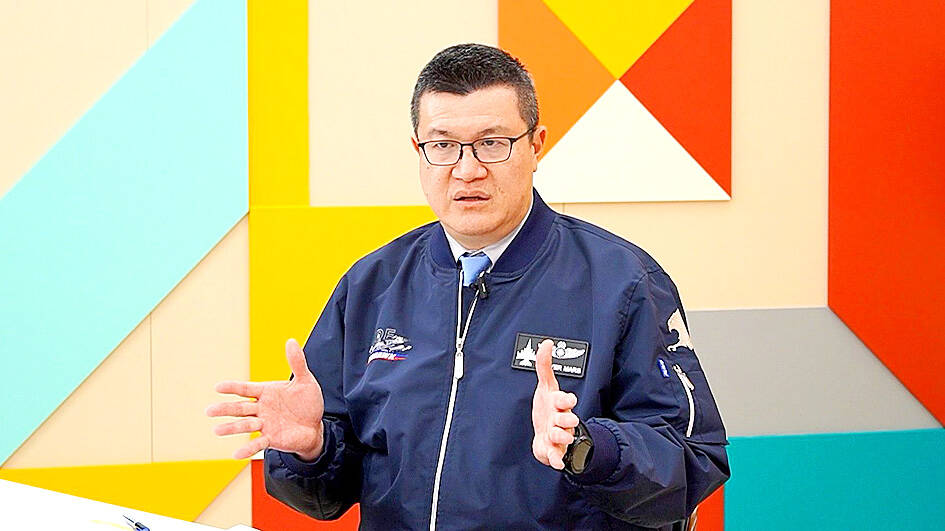The Ministry of the Interior is working to amend regulations around alternative military service to enhance civil defense resilience, Deputy Minister of the Interior Ma Shih-yuan (馬士元) said in an exclusive interview with the Liberty Times (sister paper of the Taipei Times) published yesterday.
The ministry is working to increase training days for conscripts and reservists, and establish a third-level agency to institutionalize the Substitute Service Training and Management Center, Ma said.
As part of institutionalizing the center, the ministry hopes to collaborate with universities where enrollment is low to use their facilities and campuses, Ma said.

Photo: Huang Yun-hsuan, Taipei Times
“Alternative service is also a type of military service,” he said.
Since last year, compulsory service in the armed forces has been extended to one year, which includes alternative service, a substitute civilian service managed jointly by the Ministry of National Defense and the interior ministry.
Following regulations within the Act of Military Service System (兵役法), the interior ministry is to increase the basic training period from 15 to 26 days, including training in first aid, civil defense and disaster prevention, he said.
There are about 250,000 alternative service reservists in Taiwan, with the ministry aiming to recall and train 50,000 annually so that those who previously did not receive first aid, civil defense and disaster prevention training could enhance their skills, Ma said.
Additionally, the number of reservist recall training days would be increased from one to five, he added.
The 250,000 alternative service reservists would be recruited by ministries and agencies based on their expertise, with the goal being to be able to cooperate with local offices to assist in large-scale disaster recovery efforts, Ma said.
Defense resilience is not only for wartime, but also for disaster prevention, Ma added.
Taiwan Community Emergency Response Teams (T-CERT) would also be trained to operate decommissioned emergency response vehicles, such as fire trucks and ambulances, he added.
Building “whole-of-society defense resilience” does have some difficulties, Ma said, citing the example of Internet users asking “if war breaks out, should we surrender?”
Although the public should not be naive about war, surrendering without fighting is misguided, as any sort of invasion would have major ramifications for all of Taiwan’s citizens and could tear society apart, he said.
The most important aspect of resilience is deterrence, to ensure that hostile foreign forces know that an invasion of Taiwan would not be easy, Ma said.

The manufacture of the remaining 28 M1A2T Abrams tanks Taiwan purchased from the US has recently been completed, and they are expected to be delivered within the next one to two months, a source said yesterday. The Ministry of National Defense is arranging cargo ships to transport the tanks to Taiwan as soon as possible, said the source, who is familiar with the matter. The estimated arrival time ranges from late this month to early next month, the source said. The 28 Abrams tanks make up the third and final batch of a total of 108 tanks, valued at about NT$40.5 billion

Two Taiwanese prosecutors were questioned by Chinese security personnel at their hotel during a trip to China’s Henan Province this month, the Mainland Affairs Council (MAC) said yesterday. The officers had personal information on the prosecutors, including “when they were assigned to their posts, their work locations and job titles,” MAC Deputy Minister and spokesman Liang Wen-chieh (梁文傑) said. On top of asking about their agencies and positions, the officers also questioned the prosecutors about the Cross-Strait Joint Crime-Fighting and Judicial Mutual Assistance Agreement, a pact that serves as the framework for Taiwan-China cooperation on combating crime and providing judicial assistance, Liang

A group from the Taiwanese Designers in Australia association yesterday represented Taiwan at the Midsumma Pride March in Melbourne. The march, held in the St. Kilda suburb, is the city’s largest LGBTQIA+ parade and the flagship event of the annual Midsumma Festival. It attracted more than 45,000 spectators who supported the 400 groups and 10,000 marchers that participated this year, the association said. Taiwanese Designers said they organized a team to march for Taiwan this year, joining politicians, government agencies, professionals and community organizations in showing support for LGBTQIA+ people and diverse communities. As the first country in Asia to legalize same-sex

MOTIVES QUESTIONED The PLA considers Xi’s policies toward Taiwan to be driven by personal considerations rather than military assessment, the Epoch Times reports Chinese President Xi Jinping’s (習近平) latest purge of the Chinese People’s Liberation Army (PLA) leadership might have been prompted by the military’s opposition to plans of invading Taiwan, the Epoch Times said. The Chinese military opposes waging war against Taiwan by a large consensus, putting it at odds with Xi’s vision, the Falun Gong-affiliated daily said in a report on Thursday, citing anonymous sources with insight into the PLA’s inner workings. The opposition is not the opinion of a few generals, but a widely shared view among the PLA cadre, the Epoch Times cited them as saying. “Chinese forces know full well that